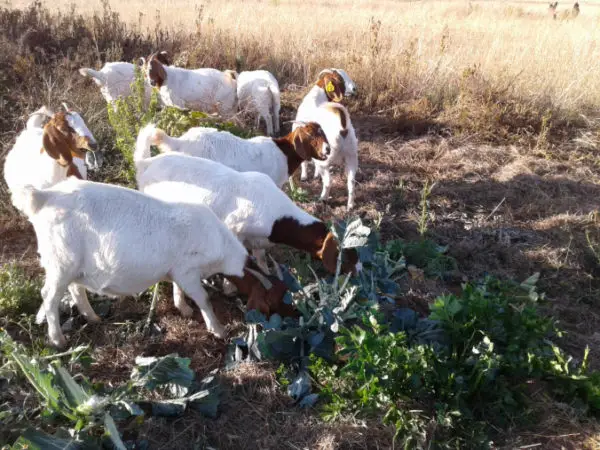The agricultural community is currently experiencing a big challenge due to increased costs of livestock feed. To exacerbate the issue, livestock farming is growing rapidly which increases the demand for feed. Unconventional feed strategies seem to be an effective solution. Studies indicate that by-products from the food industry are a feasible solution to minimise the problem of feed shortage and so can be used as feedstuffs for goats. It has been proven that goats can feed on cauliflower supplements for daily sustenance. However, farmers are advised to be aware of the exact nutritional value of cauliflower versus livestock dietary needs in order to develop an effective feeding strategy. Failure to do so deprives animals of essential nutrients thus putting them at risk of health related issues that can limit productivity and profitability.
Table of Contents
Nutritional Value
Cauliflower is a member of the cruciferous vegetable family. It is packed with a rich supply of nutrients and is considered to a nutrition powerhouse. A common misconception is that only green leafy vegetables are nutritious. This often results in the disregard of cauliflower as a potential feed source for ruminants. Goats can eat cauliflower as it consists of a variety of nutrients and minerals needed for maintenance, reproduction as well as production. Cauliflower is a great source of fibre, vitamins C, B6, B9 and K. It also contains phytochemicals and antioxidants that play a crucial role in protecting livestock from diseases. Studies reveal that cauliflower ranks among the top 25 nutritious fruits and vegetables therefore is highly recommended for livestock. To add on, goats can eat cauliflower to absorb minerals necessary for growth and daily sustenance. These include calcium, iron, sodium and sugars. Additional minerals are manganese, magnesium, phosphorous and potassium.
Goats are natural browsers and so their dietary plans are often sustained from grazing. That being said, it is important to note that formulated diets should be closely aligned with their natural diets. This means that goats can eat cauliflower only as supplementary feed. Excess feeding may cause detrimental effects to health, reproduction and production. It is recommended that cauliflower supplements are kept at approximately 10% to 40% of the overall feeding strategy. Although slight variations may not be detrimental, investigations are still ongoing hence the need to strictly adhere to these recommendations.
Physical Development
Young goats can eat cauliflower in order to acquire nutrients needed necessary for growth and development. The dietary plan for young goats must be rich in nutrients. Forage is sometimes not able to provide livestock with sufficient nutrients. This is often the case in arid areas or during dry season when forage has been overgrazed and is dry hence comprises of low nutritional value. Cauliflower supplements can be used as a supply for lacking nutrients thereby ensuring well balanced dietary plans. The vegetable contains minerals such as calcium which are important for bone, teeth and muscle development. Moreover, cauliflower consists of manganese which is an activator for enzymes involved in carbohydrate metabolism.It is also a source of fibre that plays an important role in the digestive process. The fibre found in cauliflower helps to promote feed intake and prevent digestive conditions. Resultantly, goats are provided with the opportunity to achieve full potential. As such, mature goats can feed on cauliflower so as to reach target daily weight gain. Cauliflower also contains antioxidants which help to prevent a range of illnesses thereby allowing for timely development of livestock.
Milk Production
Lactating goats can eat cauliflower as a means to absorb nutrients and minerals needed for milk production. Lactating goats have a higher demand for nutrients. The same applies to pregnant does. The process of milk production is highly demanding and so livestock provided with insufficient feedstuff quickly exhaust their body reserves. As a result, they lose a lot of weight and have low energy which in turn causes a decline in milk production. Pregnant goats can eat cauliflower so that they are able to produce good quality colostrum. Since new born goats have a poor immune system, they depend on nutrients contained in colostrum for developing immune system integrity. Poor quality colostrum exposes young goats to a number of health related issues. That being said, goats can feed on cauliflower which is a rich source of nutrients and minerals required formilk lactose, fat as well as protein content. Cauliflower is also a source of phosphorus that helps to stimulate feed intake and permits usage of metabolized body fat for milk production. Keep in mind that excess feed of cauliflower deprives goats of other nutrients which potentially causes adverse effects on milk production.
Health Maintenance
Maintenance of livestock health is at the core of every agricultural venture. This is because its success is determined by production which in turn is influenced by the health condition of goats. Ill goats are generally less productive; depending on the severity of the illness, production may cease costing farmers a lot of money in treatment. It is therefore important to develop a well-balanced feeding plan to ensure healthy livestock. Goats can eat cauliflower to get nutrients and minerals that are of the essence in maintaining immune system integrity among other functions. The results are hardy animals that are able to fight off rampant diseases and infections. Cauliflower is a rich source of trace minerals needed for enzyme activation, osmotic pressure, acid base balance and nerve transmission. Additionally, minerals found in cauliflower play an important role in blood synthesis, vitamin synthesis and reproduction. The upside of using cauliflower supplements is that not only are they highly palatable and affordable, but also provide great health benefits to livestock.
Antioxidant Agent
Goats can feed on cauliflower as a protective measure against oxidative stress. Oxidation is known to cause poor quality production. It results in poor quality yields for both dairy and meat goats. The texture, taste and nutritional value of the meat is diminished and so is the value of milk. For many years antibiotics have been used to control oxidation. However, theyare under ban or restrictions in some countries as they are said to have long term negative effects on livestock and human health. The current craze for healthier food options also calls for utilization of natural means instead of synthetic methods of managing oxidation. As such, goats can eat cauliflower which is a great source of phytochemicals and antioxidants that help to fight free radicals. Cauliflower is therefore a valuable unconventional feed source for the control of oxidation. None the less, it should be provided according to the recommended rations.

